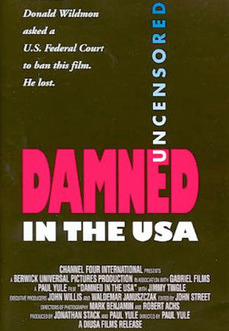Friday, June 25, 1993.
DAMNED IN THE U.S.A. British television documentary examining current censorship issues in the United States. Produced and directed by Paul Yule. Running time: 73 minutes. Rated 14 years Limited Admission with the B.C. Classifier’s warning "occasional nudity, suggestive scenes and very coarse language."
CENSORSHIP? WE'RE AGIN' IT, of course.
Isn't everyone?
No.
Religious broadcaster Donald Wildmon believes that the world is full of "sickness masquerading as art." His Tupelo, Mississippi-based American Family Association campaigns tirelessly for its elimination.
In a 1990 interview with British television documentarist Paul Yule, Wildmon takes credit for the 7-Eleven Stores decision to remove the "obscene" Playboy and Penthouse from their magazine racks, and for Pepsi Cola's decision not to air a "blasphemous" commercial featuring the popstar Madonna.
Last year [1992], the Protestant minister sued Yule. Offended by the fact that Yule's finished film, Damned in the U.S.A., includes the very material that he opposes, Wildmon went to court to block its distribution.
His action wouldn't have surprised Christie Hefner, the sensible, intelligent chairman of Playboy Enterprises. "Wildmon doesn't want to engage in a debate in the marketplace of ideas," she told Yule in a parallel interview.
"Wildmon wants to remove from the marketplace the ideas he doesn't like, and that's a very anti-American attitude."
Civil libertarian Hefner's measured comments will be well-received at this evening's [June 25, 1993] benefit screening of Damned in the U.S.A., a fundraiser for the Canadian federal customs censor's favourite bookshop, Thurlow Street's Little Sister’s.
Not nearly as objective as it could be, Yule's film signals its bias by opening with U.S. Senate floor statements from blowhard boneheads Gordon Humphrey (Republican/New Hampshire), Jesse Helms (R/ North Carolina) and Alfonse D'Amato (R/New York), three political stooges who never met a weapons appropriations bill they didn't love.
When he cuts to the "real world" of New York City streets, we hear the lyrics of Cole Porter's cheeky Anything Goes. This is used to introduce Boston-born stand-up comic Jimmy Tingle, a shirt-and-tie performer whose politically-charged humour punctuates Yule's film.
Sample line (reacting to the arrest of a Florida retailer for selling a 2 Live Crew album): "Same state where a convicted felon, legally, walked into a gun shop, bought an automatic weapon, snapped, and wiped out 11 people.
"What did they close? The record stores!"
More interested in entertainment than clarity, Yule mixes together the issues of public arts funding (the senators oppose National Endowment for the Arts grants), religiously motivated economic boycotts, and court actions against "obscenity."
The result is a muddle of impressions leading to the somewhat unfair conclusion that our cultural choice is between embittered, ding-a-ling artists and racially intolerant, homophobic fascists.
Some choice.
A film that should be a starting point for a serious discussion, Damned in the U.S.A. speaks to those already agin' censorship. Damned if it doesn't take too much pleasure in preaching to the already converted.
The above is a restored version of a Province review by Michael Walsh originally published in 1993. For additional information on this archived material, please visit my FAQ.
Afterword: First broadcast in 1991 on Britain’s Channel Four Television, Damned in the U.S.A. won an International Emmy for Best Arts Documentary. Building on his success in Europe, filmmaker Paul Yule found a U.S. distributor, a bit of entrepreneurial cheek that deeply offended decency campaigner Donald Wildmon. The homophobic fundamentalist minister brought a series of lawsuits against the film, going to court in New York, Louisiana and Mississippi. After 15 months of litigation and no wins, Wildmon suffered the indignity of seeing the picture go into release, albeit as a specialty attraction at film festivals and in repertory cinemas.
Inspired, perhaps, by his contact with British broadcasters, Wildmon took to the airwaves himself in 1991. That year he founded American Family Radio, a ministry that today includes 200 stations in 33 states. Although health issues forced him into retirement in 2010, his son Tim succeeded him as president of the umbrella American Family Association. Currently, Wildmon’s radio network is urging its listeners to shun gays, outlaw abortion, oppose labour unions and vote for the Republican presidential candidate Donald Trump.
It’s safe to assume that his 1991 encounter with Wildmon had an effect on the career if South African-born filmmaker Paul Yule. Damned in the U.S.A., his first feature-length documentary, quickly went from being a report on the mechanisms of censorship to a moment in the battle for freedom of speech. His films following that fight have included prize-winning examinations of many of the Wildmon ministry’s bugbears.
Yule's 1998 feature, Lone Star Hate, looks at homophobia and a 1993 murder in Tyler, Texas. His 2002 TV documentary Marquis de Sade - Pornographer Or Prophet? is an analysis of what Wildmon terms “sickness masquerading as art,” while his 2007 A Matter of Life and Death follows pro-choice advocate Miranda Sawyer on a trip to the American South. His 2010 film, God Don't Live Here Anymore?, focuses on what Yule calls “the religiosity of President Barack Obama (and) the emergence of a new Religious Left.” He recently returned to South Africa, where he teachs filmmaking, is active in community television production and is developing new projects.
See also: In her 1999 feature Better than Chocolate, director Anne Wheeler' offered a fine, funny, fictionalized take on the Little Sister's bookstore and its long battle with censorship.
